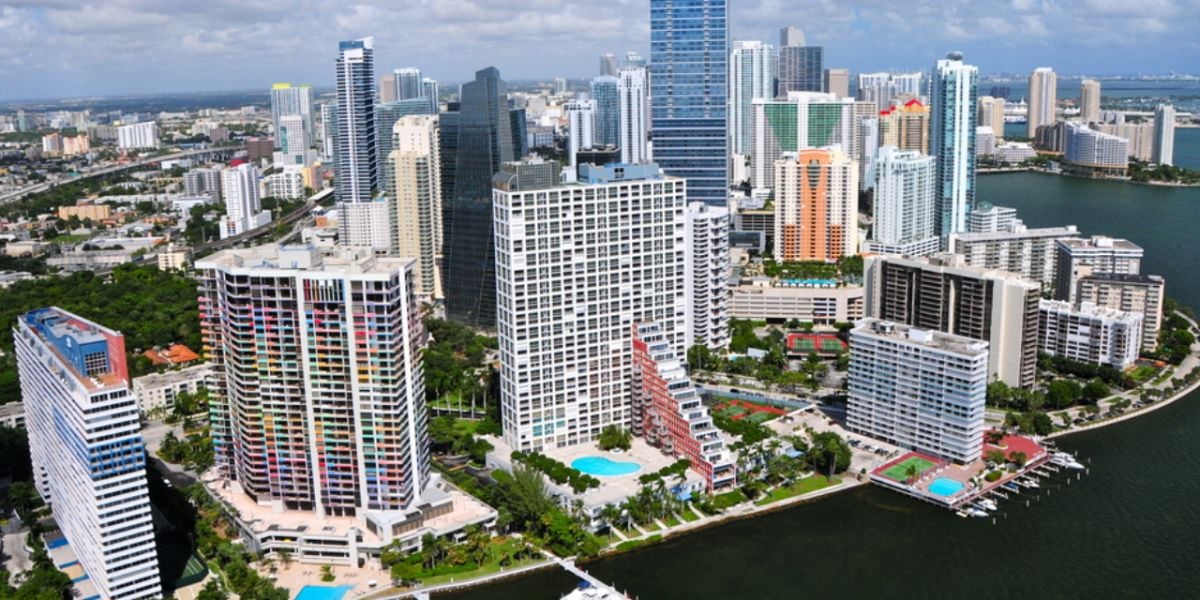
Miami is well-known for its stunning coastline, and the city also has some of the most sought-after real estate in the South, as well as a busy port and active tourism industry. What you might not know about Miami is that it consistently has job growth rates that exceed the national average, as well as some of the lowest unemployment rates in the US. Currently, Miami's economy continues to expand, driven by high in-migration, strong job creation, and record tourism numbers. The city has a reputation as one of the most dynamic labour markets in the United States, so it's an excellent place to start your job search.
The labor market in Miami
Miami's employment market is strong, with job growth in the wider area outstripping the national average. Low unemployment (around 2.5%) also sits below the national and state averages. This is partly because of the continued migration of people into the state and a diverse economy that includes healthcare, construction, and business services. There are many cities in the USA that are struggling, but Miami is not one of them. Across the country, some urban centers have seen stagnating job creation, shrinking populations, and rising unemployment linked to deindustrialisation and post-pandemic office vacancies. However, Miami is in a strong position. If you are considering a city in the USA to start job seeking in, then the Magic City has a lot to offer.
Promising industries in Miami
Various industries have added to Miami's stronger-than-normal growth. Here are some of Miami's biggest industries.
Tourism
This one should come as no surprise — Miami is a popular tourist destination, both locally and internationally. Currently, tourism has not only rebounded but surpassed pre-pandemic levels (something few places have managed to do), with more than 30 million visitors in 2025. The sector is actually one of the city's largest employers, driving job creation in hotels, restaurants, cruise operations, and entertainment. A popular destination for domestic travel, Miami attracts people from all across the USA, as well as from the rest of the world. Having such a strong domestic attraction, Miami's tourism industry is more resilient and stable than many globally dependent destinations.
Transportation
Miami is home to the Miami International Airport, which receives and sends flights across the US. Water transportation is also very lucrative in Miami, as the city is a major docking spot for international cruise lines. Cruise activity has returned to near-record activity after the hit it took during the pandemic. Air cargo and logistics at Miami International Airport have continued to expand due to e-commerce and Latin American trade.
Construction
The construction sector in Miami is a significant and dynamic industry that plays a crucial role in shaping the city's ever-changing landscape. With its booming real estate market and continuous development projects, Miami's construction sector is consistently active and vital to the city's growth. The industry is expecting job growth of about 4.3 percent, one of the highest among major U.S. counties. Thousands of multi-family housing units are currently under construction, alongside big infrastructure and office developments.
International trade
Situated as a gateway between the United States and Latin America, Miami has a robust international trade sector. The city's strategic location has led to the growth of industries like import-export, logistics, warehousing, and distribution.
Finance and banking
Miami has emerged as a major financial hub, serving as a gateway for Latin American banking and investment. The city has numerous financial institutions, private equity firms, and wealth management companies. New fintech and wealth-management firms relocating from New York and Latin America have created promising growth in this field.
Healthcare and biotechnology
Miami's healthcare sector is thriving, with world-class medical facilities, research institutions, and biotech companies. The city's diverse population also contributes to the demand for healthcare services. These sectors are among the most reliable sources of employment for skilled professionals
Education
Miami has a range of educational institutions, including universities, colleges, public and private schools, and language learning centers. These institutions provide employment for educators, administrators, and support staff.
Technology and innovation
Miami's tech scene is driven by startups, technology companies, and innovation centers. IT roles have declined in Miami lately, but the city remains a strong base for fintech, proptech (real estate technology), and health-tech startups.
Creative and arts industries
Miami's vibrant arts and culture scene supports employment in various creative fields, including art galleries, music, fashion, design, and entertainment. Big events like Art Basel Miami Beach and the Miami Film Festival attract international interest and are important in the international arts calendar.
International business
With its diverse population and strategic location, Miami is a hub for international business and trade-related services. Multinational corporations and firms specializing in global consulting, legal services, and international relations are present in the city.
Aerospace and aviation
Miami's proximity to Latin America and its well-connected airport have led to a strong presence of aviation-related businesses, including aircraft maintenance, cargo handling, and airline operations.
Entrepreneurship
Miami is one of the top US cities for startup success and small-business creation, with particular strength in fintech, health-tech, prop-tech, and international-trade startups. Currently, Miami ranks in the top 30 cities for startups worldwide. Entrepreneurial types are drawn to Miami by its tax climate, multicultural workforce, and an expanding venture-capital scene.
Where to start your job search in Miami as an expat?
There are several ways to go about your job search in Miami. In order to get a work visa, you must have employer sponsorship before applying, which means that you need to have a valid job offer from a company in Miami that is willing to sponsor your visa. Arranging a work visa can be a rather long and costly process — and, unfortunately, there are only a limited number of companies capable and willing to do so. Visa sponsorship has become increasingly competitive, and many employers in Miami now prioritize bilingual (Spanish–English) candidates for customer-facing and managerial roles.
One way to play the long game regarding your job search in Miami is to search for companies in your home country with branch offices in Miami and apply for a position there. This will make the paperwork much easier — but it does limit your search to very specific companies.
Another option is to narrow down a list of companies in Miami that you would like to work for and send applications to their HR managers directly. Make sure your CV is up-to-date and include a cover letter explaining why you want to work for this particular company. You can also use online job-hunting platforms and apply to companies in Miami with your profile and CV.
Another way to get hired by a company in Miami and settle in the city is by studying there first. This is a much longer route to go down — but it is one of the surest ways to get your career started. Studying in Miami will not only get you a degree from an American university but will also give you plenty of opportunities to network during your four years of study. Moreover, you will be able to explore internship opportunities during your studies, which could lead to a formal offer. It's possible to work in the USA after being on a student visa, and often, students can transition into the Optional Practical Training (OPT) category. If you are on an F-1 student visa, you can apply for this category, which allows you to work in your field of study for up to 12 months (or up to 36 months for STEM degree holders) after completing your studies. OPT is a great way to gain practical experience in your field and solidify your career.
Job-hunting resources in Miami
There are lots of online and offline resources that can be helpful in your Miami job search. It's recommended that you take a broad approach and make use of as many tools as you can.
Online resources
The most obvious place to start your job search in Miami is a basic Internet search for job offers in your line of work. Including the phrase “visa sponsorship” can help you narrow the search down to the companies willing to sponsor a work visa.
Register and upload your CV to popular international job-hunting platforms like Careerbuilder.com or Monster.com. You can also set up alerts for when new job offers appear in your field.
Social media can also be very helpful in your job hunt. Make sure to keep your portfolio on LinkedIn updated and set an alert for job offers from companies in Miami. You could also indicate in your profile that you are looking for opportunities in Miami. Joining expat job search groups on LinkedIn and other social networks can greatly help.
In our digital age, platforms like CareerSource South Florida have become very useful for local and international job-seekers. They offer helpful tools like free résumé reviews, interview preparation, and listings from employers that sponsor work visas.
You can also explore local industry-specific websites such as Built In Miami and Tech Hub South Florida, which highlight roles in the region's tech, marketing, and finance sectors.
Headhunting agencies
If you are an experienced professional looking for a senior position, your best option may be to go through a recruitment agency. Some of these companies narrow down their services to specific fields (engineering, IT, media, etc.), and you may be able to find one with a successful record for placing professionals in your niche.
Career fairs
If you are already in Miami and are looking for new job opportunities, consider attending a career fair. These are excellent ways to get a foot in the door with some big employers, talk to recruiters face-to-face, and make an impression. The eMerge Americas Talent Hub and Miami Dade College's annual career expos are major annual events that help connect job-seekers with employers in technology, healthcare, and hospitality.
Contact employers directly
You can also contact employers directly with your CV and cover letter and inquire about available opportunities. Make sure to research the companies you are applying to so that you can highlight how you can be of help to them in your CV and cover letter.
Applying for a job in Miami
How to compose an American CV?
Before you start your job search, make sure your CV is complete, properly formatted, and up-to-date. This is highly important for effective job hunting, and your resume can directly affect the success of your search.
American CVs often prioritize work experience and skills. Choose a format that highlights these aspects. Reverse chronological order is common, but skill-based formats are also used. CVs tend toward brevity in the US, with only relevant experience, accolades and qualifications listed.
Include your full name, phone number, email address, and LinkedIn profile (if applicable). Skip personal details like gender, marital status, or age, as these aren't required and could lead to discrimination concerns.
Begin with a brief, objective statement outlining your career goals and the value you bring to the position. Tailor it to the specific job you're applying for.
Alternatively, consider a professional summary. Highlight key skills, experiences, and accomplishments. Keep it concise while showcasing your suitability for the role.
List your work experience in reverse chronological order, starting with your most recent position. Include the company name, job title, dates, and a concise description of your responsibilities and accomplishments.
Emphasize specific achievements and contributions in each role. Use quantifiable results where possible to demonstrate your impact, such as “increased sales by X%” or “led a team of Y members”.
Mention your highest degree, the institution, and graduation date. Include any relevant certifications, licenses, or training programs that enhance your qualifications.
Include a section listing relevant skills, such as technical proficiencies, language fluency, and industry-specific skills. Use keywords from the job description to align your CV with the role's requirements.
Highlight language skills, especially if multilingual. Specify your proficiency level (e.g., fluent, intermediate) and any relevant language certificates.
If applicable, include volunteer work, internships, or relevant extracurricular activities. These can demonstrate additional skills and interests that make you a well-rounded candidate.
While the "References available upon request" statement is common, you can provide actual references if the job posting asks for them. Ensure your references are informed and willing to vouch for you.
Tailor your CV for each job application. Highlight the experiences and skills most relevant to the specific position.
Aim for a one-page CV if possible, but two pages are acceptable for more experienced candidates. Use concise language and bullet points for easy readability.
Thoroughly proofread your CV for grammar and spelling errors. Attention to detail matters in creating a professional impression.
Keep the design simple and clean. Use a readable font and maintain consistent formatting throughout. Remember, your CV is your first impression, so ensure it effectively showcases your qualifications and suitability for the role you're applying for.
Good to know:
Unless they've been specifically requested, do not send extra attachments. When contacting a potential employer for the first time, just your CV and cover letter should be enough.
How to write a cover letter
A cover letter should always accompany your CV. It serves as a way to capture the recruiter's interest in your application and provide a glimpse of your personality beyond your resume. Keep your cover letter focused and brief. Use it to explain your interest in the job and highlight why you are a strong fit for the position. Try to avoid using the same cover letter for every application. Customize your letter to align with the specific job you are applying for.
Interviewing for a job in Miami
The next step in the hiring process is the interview. Depending on your situation, your interview may be in person or online. In both cases, here are some general tips for preparing for an interview.
- Research the company you are applying to. Check what the company's mission and values are, and think about what you can bring to the team.
- Have your CV, degree, and other documentation handy.
- If you are being interviewed remotely, ensure you have a stable internet connection and that your tech is working correctly.
- Re-read your CV before the interview so that you can quickly answer CV-related questions.
- Prepare a list of questions for your employer: This can help indicate your interest in the company.
- At the end of the interview, inquire about next steps. There may be formal checks that need to be done, or a timeline for informing applicants that is helpful to know about.
Labor conditions in Miami
Labor laws in Miami, like the rest of the United States, are governed by federal and state regulations. Here are some critical points regarding labor laws in Miami.
Minimum wage
The minimum wage in Florida is on the rise. Florida voters have approved a gradual increase in the minimum wage to $15 per hour by 2026.
Overtime pay
Per federal law (Fair Labor Standards Act or FLSA), non-exempt employees in Miami and the rest of Florida are entitled to overtime pay at a rate of 1.5 times their regular hourly wage for all hours worked beyond 40 hours in a workweek.
Work hours
Like the rest of the US, the standard workweek in Miami is typically 40 hours, with most full-time positions adhering to this schedule.
Labor unions
Labor unions are active in Miami, particularly in sectors such as hospitality, healthcare, and transportation. Some well-known associations, like UNITE HERE and SEIU, are in the area. Florida is a "right-to-work" state, which means that employees are not required to join or financially support a union as a condition of employment.
Discrimination and harassment
Miami, like the rest of the US, has laws in place to protect employees from workplace discrimination and harassment based on factors such as race, gender, religion, age, disability, and national origin. Employees can file complaints with the Equal Employment Opportunity Commission (EEOC) if they believe their rights have been violated.
The work culture in Miami
Networking in Miami and building relationships at work are highly valued, and you might find business meetings happening in both formal boardrooms and casual settings. Additionally, the multicultural work environment in Miami means you'll likely encounter a mix of cultures and languages, which can enrich your work interactions.
Miami has a unique and vibrant local culture that is reflected in its various workplaces and industries, although obviously, each sector will have its differences. Some overall things to expect when working in Miami are:
Diversity and multilingualism
Miami is often called the "Gateway to the Americas" due to its significant Latin American and Caribbean influence. This cultural diversity is also reflected in the workplace, making it common to hear multiple languages spoken, including Spanish and Creole. Being multilingual can be a valuable asset in Miami's job market.
Relaxed attitude
Miami's work culture is generally more laid-back and relaxed than that of other major cities in the United States. Obviously, creative sectors tend to be more informal than finance, law, or medicine. Still, the warm climate and proximity to the beach generally contribute to a casual and relaxed work atmosphere.
Networking and relationship-building
Building relationships and networking are essential in Miami's professional landscape. Personal connections often play a significant role in career advancement and business opportunities. It's common for people to socialize outside of work hours to strengthen professional bonds. Although Miami is a big city, there can be a small-town feel regarding the importance of connections.
Work–life balance
Miami values work-life balance, and many residents prioritize their personal lives alongside their careers. The city's outdoor recreational activities, nightlife, and cultural events contribute to this emphasis on enjoying life outside of work. This is not a city where the grind is valued!
Flexibility and adaptability
Miami's economy can be volatile, with fluctuations related to factors such as tourism and hurricanes. As a result, professionals often need to be flexible and adaptable to changing circumstances.
Traffic and commuting
Miami is known for its traffic congestion, so it's essential to consider your commute when choosing where to live and work. Some residents opt for public transportation or carpooling to avoid the daily traffic jams.
Dress codes
In America, different jobs definitely come with different ways of dressing and behaving. Some jobs allow you to dress casually and be more relaxed, while others require more formal clothing and behavior. Depending on your industry and your seniority, dress codes in Miami can vary quite a lot.
In general, your clothes should match the job you do. For example, you won't see people in casual clothes at a law firm, a bank, or a medical facility. But if you're a programmer, artist, creative, or designer, you don't need smart clothes to show you're good at your job. Different jobs have different dress codes, so it's important to know what's expected of you, especially if you're new to working in Miami.
Useful links:
Work visas in the USA: Finding work as a foreign national
U.S. Bureau of Labor Statistics – Miami Area Employment
We do our best to provide accurate and up to date information. However, if you have noticed any inaccuracies in this article, please let us know in the comments section below.








